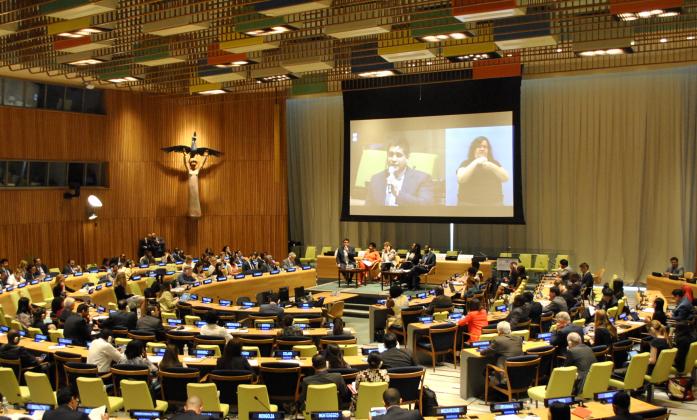
The second day of the 2016 High-level Political Forum (HLPF), began with a coordination meeting of the Major Groups and other Stakeholders, chaired by Colin Allen. This allowed civil society representatives to discuss and coordinate plans for the upcoming events. The Stakeholder Group of Persons with Disabilities were well represented at the meeting and active participants, and worked throughout the day to ensure events at the UN included International Sign and Closed Captioning where possible.
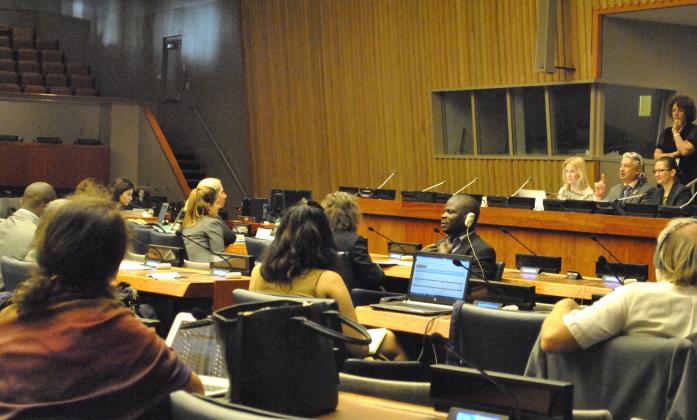
Read more about the Stakeholder Group of Persons with Disabilities
The first HLPF session of the day was a discussion on 'Food security and sustainable agriculture, climate action, sustainable oceans and terrestrial ecosystems – adopting a nexus approach'. The session included an intervention from Mohamed Ali Loufty, who explained that "the effects of climate change, including natural disasters, food insecurity, conflict, and refugee situations, make persons with disabilities disproportionately affected. During such emergency situations, persons with disabilities experience increased challenges, especially governments and relevant international organizations have not considered adequate strategies for disability inclusion in their policies and programs. Also poverty may increase the risks to persons with disabilities through malnutrition and inadequate access to education and healthcare." Mohamed Ali Loufty called on governments and the international community to "adopt the necessary strategies for disability inclusion in relevant programs for disaster management, food security, and combatting the impact of climate change. Furthermore, we ask, How can we ensure that future climate change and disaster risk reduction programming and poverty eradication programs are responsive to and inclusive of the rights of persons with disabilities, so we can achieve the ultimate goal of the SDGs - to leave no one behind."
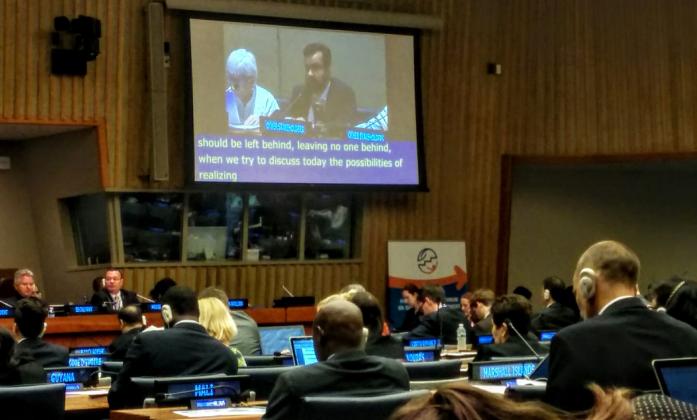
Separately but alongside the HLPF at the United Nations, the President of the General Assembly's High Level Debate on Human Rights included an interactive segment on 'Combatting Discrimination and Inequalities. José Maria Viera, of the World Blind Union, took part in this panel discussion, explaining how "discrimination and inequality will only be addressed when we stop viewing populations in silos." He emphasised that "we, persons with disabilities, are women and men, boys and girls. We are indigenous, we live in rural and remote areas. We are African, Asian, Pacific Islanders, European. We do not face discrimination and inequality on the basis of our disability alone—where we live, the colour of our skin, our age and gender contributes to our lives and how we live." Linking to the HLPF, he explained that "the 2030 Agenda will only be realized when we recognize that discrimination and inequality exits in layers. So we must work together to ensure that we are taking everyone into account—that we are truly leaving no one behind."
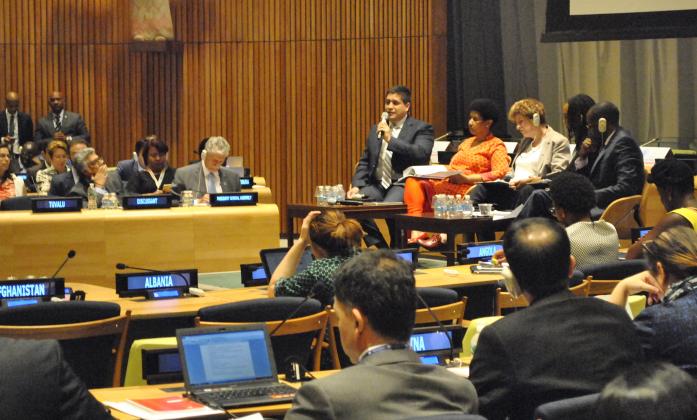
![]() Download full text here, in English (delivered in Spanish)
Download full text here, in English (delivered in Spanish)
The Stakeholder Group of Persons with Disabilities were active across multiple side-events to the HLPF. Anna MacQuarrie of Inclusion International and Mosharraf Hossain of ADD International attended a high level discussion, which included UN Secretary-General Ban Ki-Moon, with the Global Partnership to End Violence Against Children. Yetnebersh Nigussie also took part as a panelist in an discussion of 'A Human Rights Approach to Combating Inequalities and Discrimination' hosted by UN OHCHR, the Center for Economic and Social Rights and Human Rights Watch, and the Permanent Missions of Finland and Chile to the United Nations. Yetnebersh Nigussie discussed the "need to clearly map out the various causes of inequalities and try to tackle them comprehensively. Even though there is a general consensus to the marginalization of persons with disabilities by development actors, there is a need to understand that persons with disabilities are heterogenous groups. Even Among them, women and girls with disabilities as well as those with multiple disabilities are left farthest behind." She also highlighted that "women and girls with disabilities experience higher rates of gender-based violence, sexual abuse, neglect, maltreatment and exploitation than women and girls without disabilities" and that "such violence may happen in all settings including in homes, schools and institutions. One survey of 3,706 primary school children aged 11–14 in Uganda found that 24% of disabled girls reported experiencing sexual violence at school compared with 12% of non-disabled girls."
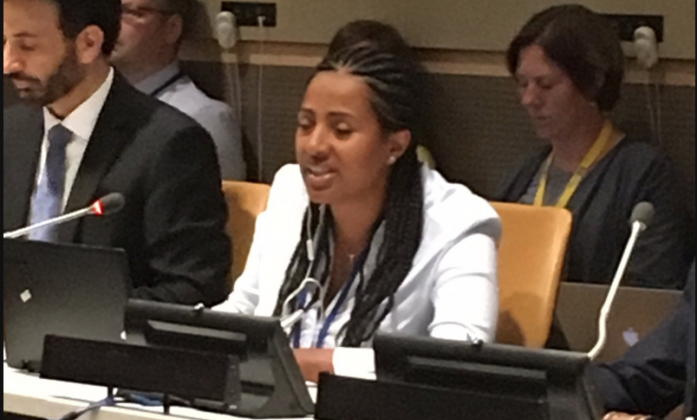
Colin Allen also took part in a discussion to raise the question: Is Civil Society Participation Shrinking after the Adoption of the 2030 Agenda? This discussion was a side event to the PGA's High Level Debate on Human Rights, and also included with Mr. Stavros Lambrinidis, the EU Special Representative for Human Rights, a representative of the Permanent Mission of the United Kingdom, Salil Shetty, the Secretary-General of Amnesty International, World Vision International's Global Campaign Director Andrew Hasset, and Quinn McKew, Deputy Executive Director of ARTICLE 19. The discussion was moderated by Peggy Hicks of OHCHR. Colin Allen discussed the experience of civil society representatives at the recent Conference of States Parties to the CRPD in June, where, "on the 10th anniversary of the adoption of the CRPD, we, people with disabilities, had to fight for a respected voice in the Conference that exists to monitor and implement the Convention we worked with Member States to build. We have to fight for a space to be heard, to be recognized as equal partners." He explained to other participants that "it is clear that when civil society is engaged from the beginning, the end result takes a holistic and people-centered approach. We must demand the space for civil society to ensure that decisions, planning and processes are developed in the right way, the first time round."
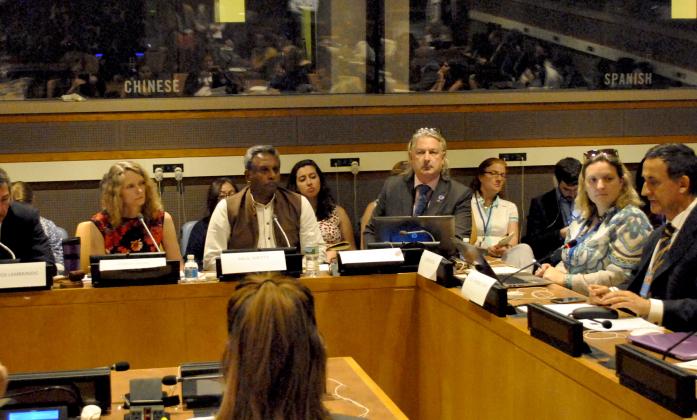
![]() Download the full text here - The whole event was also livestreamed on Periscope and followed by 180 people, it can be replayed here: https://twitter.com/IDA_CRPD_Forum/status/752915493535748096
Download the full text here - The whole event was also livestreamed on Periscope and followed by 180 people, it can be replayed here: https://twitter.com/IDA_CRPD_Forum/status/752915493535748096
In the day's final session of the HLPF, a discussion of the Science-Policy Interface, on 'Ideas, Insights, and Solutions', Ambrose Murangira, of the Uganda National Association of the Deaf, explained, in Ugandan Sign language, that 'in order to bridge digital and knowledge divides it is important to take a multidimensional approach and include an evolving understanding of what constitutes access, emphasizing the quality of that access. We must talk about speed, stability, affordability, language, local content and accessibility for persons with disabilities as core elements of quality." He then asked the panelists, How can we ensure that, by 2030, persons with disabilities have equal opportunities to be agents of change in the field of science, what is the best way to address the specific information and communications technology challenges faced by persons with disabilities?
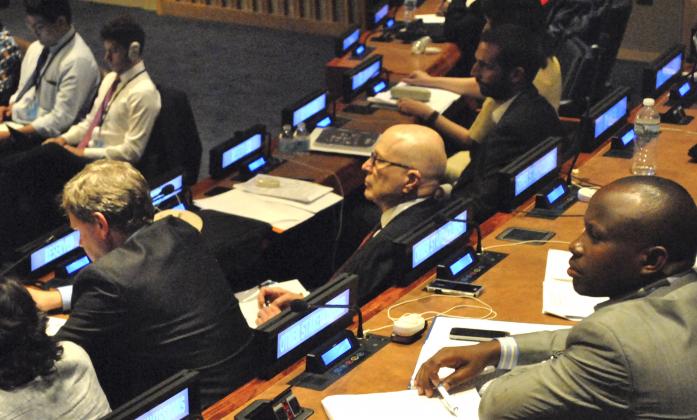
Click here to play the full intervention on Youtube, thanks to Disability Rights Fund
The main sessions of the HLPF are broadcast live on the UN's WebTV with closed captioning, and will be made available for replaying later.
Follow us throughout the HLPF online here: http://www.internationaldisabilityalliance.org/events/high-level-political-forum-2016
And by using #HLPF2016 #SDGs and #LeaveNoOneBehind
